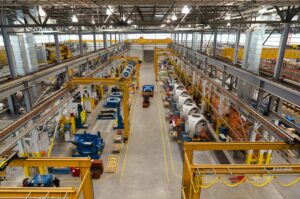5G and edge computing technologies have the potential to help organisations deliver a wide range of exciting products and services. In this piece, Tata Communications’...
Cloud computing is revolutionising business IT, improving collaboration and productivity as well as allowing for significant cost reductions. In this piece Rajarshi Purkayastha, Head, Pre-Sales, India and MECAA, Tata Communications, explores how cloud is transforming the global manufacturing economy and the benefits it can bring to organisations in the sector.
If there is one technology that has catapulted to every organisation’s top priority list it is the cloud. Catalysed by digital experience platforms, self-serve portals, and virtualised collaboration, businesses are adopting modern technologies to differentiate and compete in market. Yet, the shift is still gradual. While some industries like eCommerce, IT, and finance have matured their cloud strategy, and are reaping the benefits, others are yet to fully maximise the potential of cloud – the manufacturing sector being case in point. What is holding manufacturing back? “Cloud-native” in manufacturing operations remains less mature than on-premise deployments. This is because it is still difficult to customise due to the complexity of the legacy processes, and also because it presents integration challenges in absence of readily available API or any electronic interfaces.
What is holding manufacturing back? “Cloud-native” in manufacturing operations remains less mature than on-premise deployments. This is because it is still difficult to customise due to the complexity of the legacy processes, and also because it presents integration challenges in absence of readily available API or any electronic interfaces.
Regulatory and compliance requirements can pose a challenge for cloud models — especially where sensitive data is involved. In addition to this, IT units in manufacturing are learning the ropes of negotiating service agreement including license terms and conditions with vendors selling cloud-native business applications. It is time that manufacturing enterprises realise their cloud moment. The manufacturing lifecycle extends right from R&D to demand sensing, from supply chain, production to distribution and after sales. Cloud has the ability to transform the entire manufacturing lifecycle by embedding digital and centralised solutions at each phase of the journey which enables companies to be responsive, re-configurable, adaptable, and flexible. In one word, it allows companies to be agile."Designing and orchestrating a hybrid cloud environment that suits business requirements and integrates different parts of the manufacturing ecosystem alongside existing legacy infrastructure is also a complex process."
It can transform the production processes, from how products are researched, designed, and developed through highly scalable and secured testbeds, to how they are manufactured, distributed, and consumed. Cloud is also transforming and digitising the entire supply chain and fleet management for better tracking, monitoring and management perspective; it is also providing an integral view on how the production environments are getting integrated into industrial supply chains. This enables the “just-in-time” philosophy, which results in production efficiency with managed costs."Cloud can revamp the existing decentralised and distributed processes like demand sensing, production into one seamless and centralised unit which will help manufactures to design and launch more customer centric, targeted products in a time bound manner."
 Cloud and new-age technologies allows manufacturers to adopt many forms of new production systems, from 3D printing and high-performance computing (HPC) to the Internet of Things (IoT) and industrial robots. Moreover, cloud computing democratises access to and use of these technologies by small manufacturers. As an example, the Smart Factory uses different combinations of modern technologies to build hyper-flexible, self-adapting manufacturing capabilities. Frontline workers and technology interact in an open, connected, and coordinated fashion, reducing not only the overall production cost but the production time - which in turn fuels the digital supply chain and Industry 4.0 programmes. Many manufacturers are turning to cloud computing to better manage their end-to-end production life cycle. Empowered Edge is being driven by IoT and the need to keep processing close to the plant, rather than on a centralised cloud server. However, instead of replacing existing systems at great expense, cloud and edge computing are evolving as complementary models to legacy architectures. Inside factories, this creates opportunities to access new data sources and improve insights into production performance. More broadly, the maturation of 5G offers a creative way to decentralise manufacturing capacity into mobile factories which are smaller, more portable and supported by an ecosystem of partners. Globally, cloud technology looks set to enable manufacturing firms to
increase their business activities and reduce their operating costs.
The impact of COVID-19
Global manufacturers are re-establishing business practices in line with new priorities. They are looking to: strengthen current production processes and workplace environments with smart manufacturing ecosystems, to improve worker safety, adhere to government mandates and ensure business continuity. The post-COVID era will be heavily driven by technology and managed by robust IT infrastructure, leading to borderless growth and productivity gains. The role of the technology leaders are very crucial in this time as they have to work on an agile digital foundation which can support and create digital models across the manufacturing value chain that has the ability to leverage and analyse data to create competitive advantages while establishing a framework for ubiquitous security.
Cloud can help manufacturing enterprises realise their goals of smart factories, intelligent production, and the larger Industry 4.0 transformation
by enabling:
Cloud and new-age technologies allows manufacturers to adopt many forms of new production systems, from 3D printing and high-performance computing (HPC) to the Internet of Things (IoT) and industrial robots. Moreover, cloud computing democratises access to and use of these technologies by small manufacturers. As an example, the Smart Factory uses different combinations of modern technologies to build hyper-flexible, self-adapting manufacturing capabilities. Frontline workers and technology interact in an open, connected, and coordinated fashion, reducing not only the overall production cost but the production time - which in turn fuels the digital supply chain and Industry 4.0 programmes. Many manufacturers are turning to cloud computing to better manage their end-to-end production life cycle. Empowered Edge is being driven by IoT and the need to keep processing close to the plant, rather than on a centralised cloud server. However, instead of replacing existing systems at great expense, cloud and edge computing are evolving as complementary models to legacy architectures. Inside factories, this creates opportunities to access new data sources and improve insights into production performance. More broadly, the maturation of 5G offers a creative way to decentralise manufacturing capacity into mobile factories which are smaller, more portable and supported by an ecosystem of partners. Globally, cloud technology looks set to enable manufacturing firms to
increase their business activities and reduce their operating costs.
The impact of COVID-19
Global manufacturers are re-establishing business practices in line with new priorities. They are looking to: strengthen current production processes and workplace environments with smart manufacturing ecosystems, to improve worker safety, adhere to government mandates and ensure business continuity. The post-COVID era will be heavily driven by technology and managed by robust IT infrastructure, leading to borderless growth and productivity gains. The role of the technology leaders are very crucial in this time as they have to work on an agile digital foundation which can support and create digital models across the manufacturing value chain that has the ability to leverage and analyse data to create competitive advantages while establishing a framework for ubiquitous security.
Cloud can help manufacturing enterprises realise their goals of smart factories, intelligent production, and the larger Industry 4.0 transformation
by enabling:
- Highly scalable IT infrastructure to run the resource hungry high-performance design tools
- State-of-the-art demand sensing through real-time data tracking and data analytics
- Collaborative smart processes and delivery of customised products
- Use of automation, AI/ML and IoT extensively
- Implementation of agile and efficient High-Performance Computing (HCI) in production
- A cloud enabled digital supply chain which connects every phases of the ecosystem from suppliers to consumers for better visibility and tracking
- Implement data analytics and data driven decision making to launch more customer centric products and campaigns

It is not only transforming the R&D, production processes and supply chains, cloud is playing a key role towards enabling and democratising new manufacturing production systems such as 3D printing (i.e., additive manufacturing), generative design, and the Industrial Internet of Things. In fact, digital services such as cloud computing now provide at least 25 percent of the total inputs that go into finished manufactured products. Critical challenges for manufacturing organisations adopting cloud is still there, which includes dated IT Infrastructure and data management processes, managing the ERP environment, up-skilling, and re-skilling challenges etc. The cutting-edge technologies like AR/VR, Software Defined Network, Security Solutions, Collaboration tools or the SaaS and PaaS platforms can transform the current landscape, but everything is closely coupled with cloud, as cloud not only offers the compute and storage, it also facilitates the technology implementations. In essence, cloud computing will shape the future of manufacturing in a vast number of ways, broaden the horizon for future modernisation and its impact will be profound. Discover more about the technology that’s helping to make the world a better place."At the enterprise level, cloud is impacting how companies manage their operations, from demand sensing to enterprise resource planning (ERP) and financial management to data analytics and workforce training."
Leaders In Our Own Right
Explore related solution
As part of Tata Communications’ aim to drive innovation in digital technologies and promote diversity, the company supported the East Barnet School’s all-female robotics...
It’s been another busy year on the New World blog, with posts about everything from how eSIM technology can fulfil its potential to the ways in which artificial...
What’s next?
Explore Our Solutions
Explore our solutions through immersive platform demos or engage with our surveys and pricing calculators
Explore Our Solutions
Explore our solutions through immersive platform demos or engage with our surveys and pricing calculators
Explore Our Solutions
Explore our solutions through immersive platform demos or engage with our surveys and pricing calculators


.png?width=310&height=159&name=image%20(1).png)